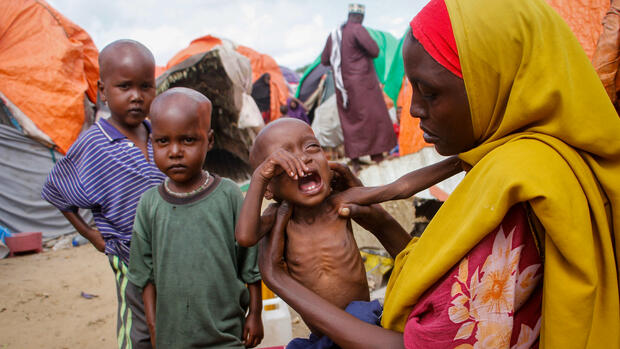The reception and care of climate refugees from their own country or neighboring regions poses an enormous challenge for many countries.
(Photo: dpa)
Berlin One day before the refugee summit in the Chancellery, migration experts are warning of new refugee movements due to environmental changes and extreme weather events. In its annual report published on Tuesday, the Advisory Council on Integration and Migration (SVR) therefore proposes new visa formats in order to be able to grant climate refugees temporary or permanent protection.
Because of their geographical location, the consequences of climate change are particularly affecting the poor countries of the Global South, which often lack the financial means for adaptation measures, says Dresden political scientist and SVR chairman Hans Vorländer.
When drought or flooding make regions uninhabitable, there are refugee movements in their own country or in neighboring countries that are often also affected. “It is important to find fair solutions for particularly vulnerable people and countries,” emphasizes Vorländer.
The assumptions about the possible extent of migration triggered by climate change vary widely depending on the method chosen and the underlying factors. The World Bank estimates that between 44 and 216 million people could be forced to leave their homes by 2025 – depending on how greenhouse gas emissions develop or what development progress poorer countries make.
The Intergovernmental Panel on Climate Change estimates that the global risk of being displaced by flooding increases by 50 percent if the average temperature rises by one degree Celsius.
New aid for climate refugees
The federal government should therefore take on a pioneering role in helping climate refugees, suggests the SVR, which sees itself as an independent body for political advice. To this end, he brings a climate passport, a climate card and a climate work visa into play as new instruments.
Read more about climate change
The already discussed climate passport is aimed at people who lose their entire habitat as a result of drought or flooding. They received a permanent right of residence in Germany.
The climate card grants people a limited right of residence who temporarily lose their homeland as a result of climate events. In view of the expected high numbers, the Council is proposing quotas here. In addition, the countries of origin must implement adaptation measures that will allow the refugees to return in the future.
Western Balkans regulation is a model for the climate work visa
The climate work visa follows the model of the so-called Western Balkans regulation. This was originally created to relieve the asylum system and enables citizens of the Western Balkans to take jobs in Germany without formal qualifications.
>> Read here: Munich Re boss Wenning criticizes climate policy – “There are many good declarations of intent”
According to the ideas of the Council members, this possibility could also be opened up to a certain contingent of citizens from countries that are particularly suffering from climate change. Vorländer emphasizes that this is a “particularly innovative instrument”, as there have hardly been any migration programs with which emigration due to climate-related environmental changes can be controlled internationally.
The nine scientists on the Council, who belong to various disciplines and research institutions, are also campaigning for a larger overall strategy and are calling for the responsibility of the industrialized countries.
They not only have to reduce their greenhouse gas emissions quickly, but also provide technological and financial support to countries severely affected by climate change in their adaptation measures, says the Bochum psychologist and Vice Chair of the SVR, Birgit Leyendecker. This is only possible within the framework of a climate foreign and development policy that also includes disaster relief.
Climate passport has been in the debate for a long time
The debate about the consequences of climate-related migration has occupied Germany for a long time. As early as 2019, the Greens in the Bundestag had brought the idea of a climate pass into the parliamentary debate. “If it is foreseeable that, for example, island states in the Pacific will disappear completely, it is urgently necessary to determine what consequences the loss of territory will have for those affected, their nationality and their right to protection under international law,” it said at the time.
Last year, Katrin Göring-Eckardt (Greens), Vice-President of the Bundestag, called for the idea of a climate passport for climate-displaced people to be promoted internationally. She spoke of a global task “which we must not postpone indefinitely into the future”.
More: Drought and its consequences – These graphics document the struggle for water
